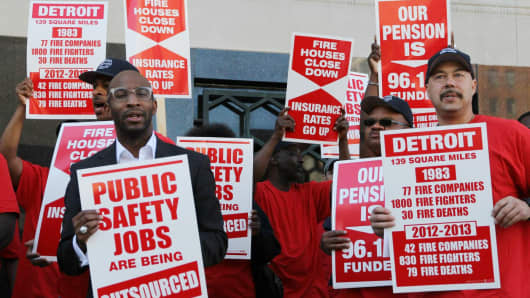Recapping the day's news and newsmakers through the lens of CNBC.
Detroit and Fed plans undercut municipal bonds
Notes:
May you live in boring times.
That's the hope of most municipal bond investors—a twist on the old Chinese curse about living in interesting ones. Muni owners want dependable income, steady bond prices and, especially for the well-to-do, shelter from taxes. Sadly, boring is not what muni owners are getting.
The latest problem is the Detroit bankruptcy. Many investors are worried it could set an unwelcome precedent by making holders of Detroit's general obligation bonds move further back in the line of creditors, reducing the chance they'll get all they are owed.
Among the big questions is whether Detroit's emergency manager, Kevyn Orr, will prevail with his plan to treat some classes of munis as unsecured debt.
This comes atop the worry that muni prices, like those of many bonds, could be hammered by rising interest rates after the Fed reduces its programs for keeping rates low.
The result: muni prices are falling, yields are rising and some investors are heading toward the exits. Since early May, the yield on the 10-year AAA muni, as defined by the MMD scale, has gone from 1.66 percent to 2.75 percent. With munis looking riskier, investors have pulled more than $16 billion out of muni funds in the past few weeks.
The fallout so far has not been too bad—yields on at-risk bonds would have jumped even further if that was the case—but everyone is watching.
Quotes:
"The reason people are so concerned is there has been an expectation that GO [general obligation] is about as good as it can get, and even in a bankruptcy it ought to take priority over some other liabilities, and what Kevyn Orr is trying to do is treat all the unsecured debt with parity."—Patrick Early, chief municipal analyst at Wells Fargo Advisors
"If the legal theories that are being asserted by the emergency manager and [law firm] Jones Day are upheld, it would not be a great thing for general obligation bonds, and the rating agencies would have concerns."—Blake Anderson of Mesirow Financial
America is a happy place
Notes:
Are you feeling OK about things? If so, you're in sync with the typical American consumer.
In fact, U.S. consumer sentiment hit its highest level in six years in July, as more Americans feel better about the economy. The Thomson Reuters/University of Michigan index climbed to 85.1 in this month's report, from 84.1 in June. It is the highest level since July 2007.
Of course, consumers realize things aren't perfect. The survey showed they expect interest rates to rise, and that they doubt the economic improvement can keep up the pace. Fear of higher rates has caused many to buy now what they otherwise might buy later, and that could result in lower purchases in the future.
Quote:
"This high level of confidence points toward a continued expansion of consumer spending in the year ahead."—Survey Director Richard Curtin
Yang and yin, an update
Notes:
Remember, it's buy low, sell high, not the other way around.
All investors know this, but what they know isn't always reflected in what they do.
Attracted by rising share prices, investors are moving money into stock funds. The best time for that was when stocks were in the basement a few years ago. Oh well, that's just how people do things.
Lipper reports that $5.3 billion moved into stock funds and ETFs this week. Cash clearly is not king, as they pulled $12.68 billion out of money market funds.
Among the curiosities was the $4.56 billion that moved into taxable bond funds. With interest rates likely to rise, bond prices could fall, making this a bad time for new bond investments. But CNBC's Bob Pisani explains that much of the flow into bond funds was to high-yield funds. Apparently, investors just can't resist the impulse to chase yield, and junk bonds look safer when companies are doing well.
The move toward stocks does not yet reflect the long-anticipated "Great Rotation," when investors flock from debt to equities en masse, but it does seem to reflect a fundamental optimism.
Though investors who are just now returning to stocks have missed a lot of gains, there could be more ahead. Halfway through the second-quarter reporting period, 52 percent of S&P 500 firms have reported, with average earnings up 4.5 percent and revenue down 0.5 percent. Many experts are optimistic for the current quarter, with the consensus forecasting 5.1 percent earnings growth.
Quote:
"There's no Great Rotation, but inflows into stock funds continue."—CNBC's Bob Pisani
And the next Fed chairman will be ...
Notes:
Well, we don't know, as the White House says President Barack Obama won't decide until fall. But if Wall Street has its way, Janet Yellen, currently the vice chair, would replace Ben Bernanke, whose term expires in January.
A CNBC survey shows 70 percent of the 40 participants would pick Yellen. First runner-up was former Treasury Secretary Larry Summers, who got just 25 percent of the vote. Yellen beat Summers in seven of the 10 qualities considered key to a Fed chairman's success.
Quote:
"Yellen wins hands down on what matters most to markets...The street in general prefers no change, or a known quantity to an unknown quantity."—CNBC's Steve Liesman
—By Jeff Brown, special to CNBC.com


